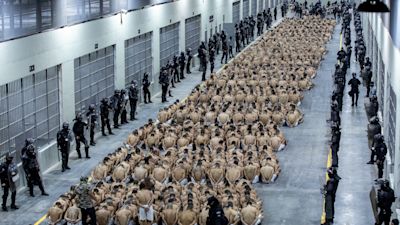In a bold and controversial move, El Salvador’s President Nayib Bukele has announced plans to double the size of the country’s maximum-security prison, the Terrorism Confinement Center (CECOT), which currently holds up to 40,000 inmates.
The expansion comes amid a secretive but growing agreement with the U.S. government to house deported individuals, many of them accused of gang affiliations or criminal behavior, within the sprawling facility.
Originally opened in early 2023 as part of Bukele’s aggressive crackdown on gang violence, CECOT has become notorious for its harsh conditions.
The prison, touted as the largest in the Americas, is designed to be inescapable and has drawn both national pride and international condemnation.
Human rights organizations report overcrowding, beatings, food deprivation, and restricted medical access. Dozens of inmates have reportedly died under unclear circumstances.
Now, CECOT is under even greater scrutiny following revelations that the U.S. has begun deporting not only undocumented immigrants but also individuals with legal status—and in some cases, even U.S. citizens—into the Salvadoran prison system.
One such case is that of Kilmar Ábrego García, a U.S. legal resident who was mistakenly deported and imprisoned in CECOT, igniting legal challenges and public outcry.
The Biden administration has not officially confirmed the arrangement, but insiders claim the move relies on a rarely used 1798 law, the Alien Enemies Act, to fast-track deportations without court hearings.
Former President Donald Trump, who is campaigning for re-election, has publicly praised the CECOT model and suggested expanding its use to process and detain suspected criminals, even some born in the U.S.
Critics argue the agreement undermines legal protections and due process, while supporters see it as a tough-on-crime solution amid concerns about gang violence and border security.
For El Salvador, the arrangement may serve both as a display of Bukele’s political power and a financial opportunity, as the country positions itself as a regional partner in the global fight against crime.
Despite international criticism, Bukele remains popular domestically.
With construction already underway to double CECOT’s capacity, the prison is set to become a central symbol not just of El Salvador’s internal security policy, but also of the growing intersection between U.S. immigration enforcement and foreign detention networks.
Whether this strategy will curb crime or spark deeper human rights controversies remains to be seen. For now, the walls of CECOT are growing—and so is the debate.

